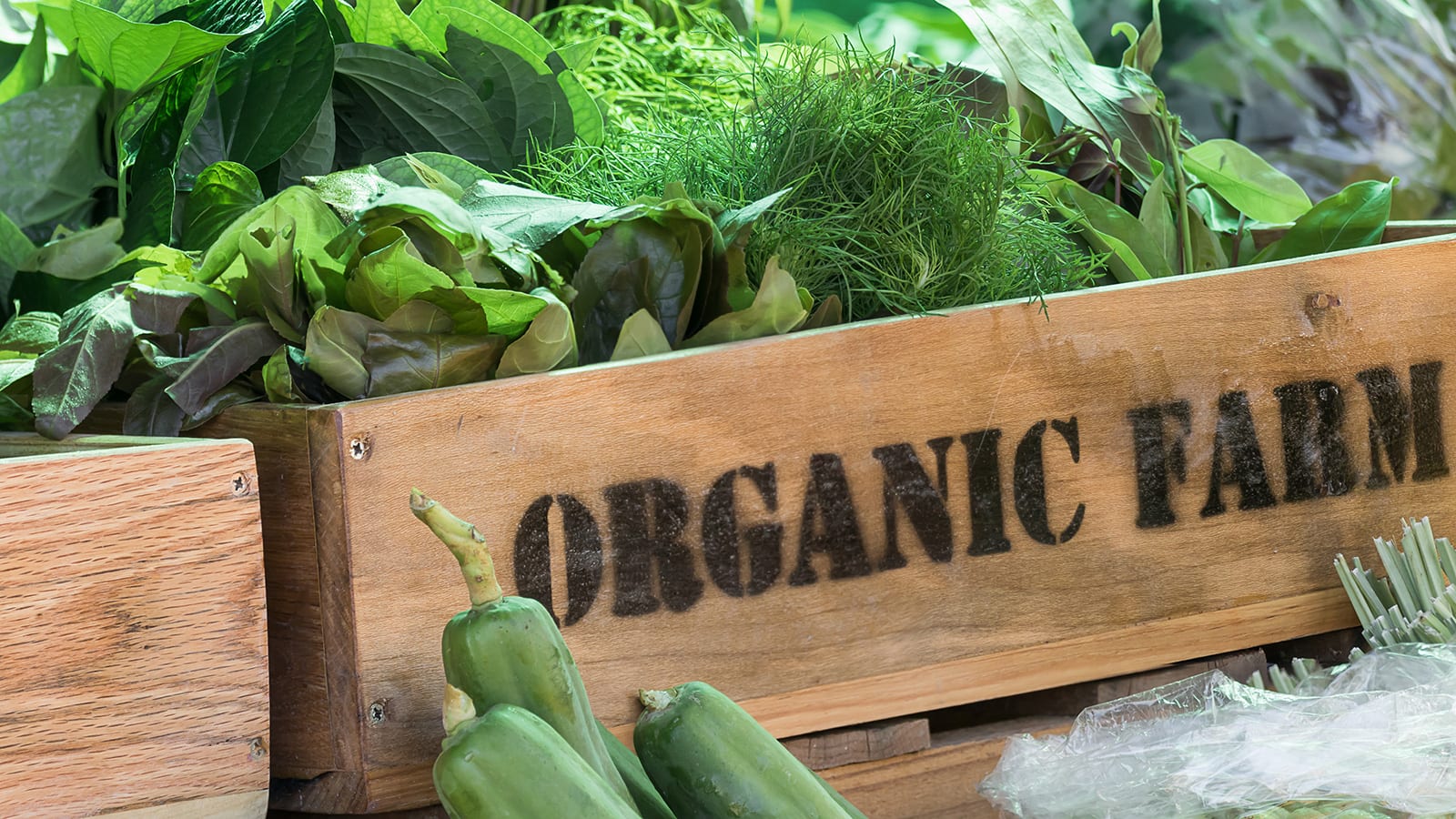Decades of supporting organic agriculture
This article was originally published in September 2023

The word “organic” is mainstream today, but it took decades to elevate organic food and agriculture from a fringe concept to a strictly regulated standard. PCC members, staff and suppliers have consistently worked over decades to enhance organics—helping establish state and then federal standards, protecting their integrity, and expanding access to organic products.
We’re proud of support from partners like the National Organic Coalition, whose executive director, Abby Youngblood, said recently that PCC is “showing up time after time.” Co-op sustainability specialists have met with representatives in Congress, advocated legislation that advances organics, helped close loopholes and maintained high standards in the regulations.
In the 1990s, for instance, PCC was instrumental in starting both the organic egg and organic milk markets in the Puget Sound region. PCC staff helped build organic standards in Washington state and fought for stringent federal standards. (In 1997, PCC members sent more than 30,000 comments to the U.S. Department of Agriculture (USDA) on the proposed regulations, representing a full 10% of all comments received nationwide.) Goldie Caughlan, PCC’s longtime nutrition education manager, later served on the National Organic Standards Board, the federal organics advisory board.
This year PCC marks its 20th anniversary as a certified organic retailer, a voluntary certification process that requires exhaustive record-keeping, protocols, staff training and other investments. PCC’s produce selection is 95% organic, and last year the co-op far exceeded its 5-year goals for adding organic products, bringing more than 2,100 new items to grocery shelves.
While improvements can always be made in organic regulations—and PCC continues to advocate for strengthened requirements—USDA Organic remains a gold standard. Unlike most product labels, it is precisely defined and backed by federal regulations and enforcement. As the co-op celebrates its 70th anniversary this year, organic remains a PCC bedrock. Here are current endeavors from just three key partners helping defend, improve and expand its protections.
The Coalition for Organic and Regenerative Agriculture (CORA)
Organics got a powerful boost in Washington state last year when this group of farmers, businesses, organizations and activists joined together. With founding organizers from the Tilth Alliance (the group’s fiscal sponsor and administrative coordinator) and PCC, CORA advocates for progressive programs and policies supporting organic and regenerative agriculture in Washington.
It got off to a strong start, establishing a governing council, signing up members,
and hiring a lobbyist. In one early achievement, working with Sen. Sharon Shewmake (D-Bellingham), CORA helped secure $200,000 in the state budget to evaluate Washington’s organic sector and its contributions to Washington’s climate goals.
“We consider this to be just one of the first baby steps toward a much larger organic action plan for Washington,” said Melissa Spear, executive director of the Tilth Alliance.
“We are number two in the nation in terms of organic sales. It’s an important sector but we don’t feel that it gets the recognition it should,” Spear said. CORA has established six focus areas from planning to research to infrastructure.
Spear sees CORA as “part of a long history of organic activism” in Washington, and said there’s a lot PCC members can still do to help—including joining the organization and responding to its action alerts. “If we’re able to say (to a legislator), we have 50 members in your district who support our advocacy agenda, that’s actually very powerful.”
National Organic Coalition (NOC)
Establishing national organic standards in 2002 was a major step forward for organics—but not the end of the journey. Since 2003, the National Organic Coalition has shouldered the continuous advocacy work needed to keep the program strong. Its work focuses on three different realms: Congress, the U.S. Department of Agriculture, and the National Organic Standards Board (NOSB).
Sometimes these battles take place in the fine details, such as weighing in on whether a new ingredient should be permitted in organic foods. Sometimes they’re major organizational endeavors, such as “fly-ins” where NOC members meet with dozens of Congressional offices.
“You have all these lobbyists on the Hill, who have a lot of resources at their disposal to try to keep the food system the way it is, like the industrial (interests) propping up the industrial system and propping up agri-businesses…” said Abby Youngblood, NOC’s executive director. “We are a pretty small team, trying to have a big impact. But I think part of our power comes from our members.”
The alliance encompasses a wide spectrum of interests: environmental and farming organizations, retailers like PCC, consumer groups, certification agencies and others. The pool of potential stakeholders has only grown with wider understanding that choosing organics helps the climate.
Progress can feel slow working with politics and regulations, but Youngblood said last year was “game-changing.”
NOC’s annual report details some of those highlights: The Strengthening Organic Enforcement Rule, a “massive rewrite” of organic regulations, will help tackle fraud. A $300 million federal investment in organic and transitioning farmers will “help build a more ecologically sound, resilient and climate-friendly food and farm system,” the report said. A $2 million annual boost in funding for the National Organic Program will help enforce and update organic standards. And the USDA published a final “Origin of Livestock” rule that will help smaller family-owned organic dairies survive, following years of advocacy from NOC members including PCC.
Many things have changed in the 21 years since USDA organic standards were established. The size of the industry has exploded, Youngblood noted, and new challenges rose accordingly.
A major goal this year is continued funding for technical help for people transitioning to organic farms, and a focus on how to help underserved farmers who have faced systemic barriers.
What can PCC members do to help? Youngblood suggests subscribing to the NOC newsletter to track current issues and action alerts—and, as Spear from CORA suggested, Youngblood urged individuals to be aware of their own power and to talk with their representatives about policies they support.
One significant ongoing issue is a structural one. Updating organic regulations can be a lengthy, difficult process. Recommendations from the NOSB are sometimes ignored, frustrating constituents and sometimes eroding their support.
“We need a regulatory process that is more responsive and we need Congress to direct USDA to get this done more quickly,” Youngblood said. She is “cautiously, cautiously hopeful” that with this issue, as with others in the past, legislation in the works will make a difference.

Oregon Tilth and the Transition to Organic Partnership Program (TOPP)
Echoes still reverberate today from a 1974 speech by poet and farmer Wendell Berry.
Berry’s words at a symposium in Spokane inspired a Northwest Conference on Alternative Agriculture in Ellensberg, and ultimately what is now known as the Tilth Allliance in Seattle and independent groups in other states.
Oregon Tilth has been a powerhouse promoting organic agriculture since those early years. Members were heavily involved in laying the groundwork for national organic standards, and the nonprofit has been a leader in certifying organic farms and producers as well as education and advocacy.
It’s now the Northwest’s lead agency for a new federal program that has thrilled and invigorated organic advocates. The Transition to Organic Partnership Program will invest up to $100 million over five years nationwide to help nonprofit organic certifiers in six regions provide technical assistance and other services to farmers transitioning to organic certification.
While farmers can generally charge more for organic products than conventional ones, certification can be costly. There are associated complications like the three-year transition period where growers cannot use prohibited fertilizers or pesticides but also cannot charge an organic premium for their crops.
We consider this….one of the first baby steps toward a much larger organic action plan for Washington
The TOPP investment targeting transitional farms is unprecedented—and exciting, said Ben Bowell, education and advocacy manager for Oregon Tilth.
A starting piece is a farmer-to-farmer mentorship program, with Oregon Tilth recruiting experienced organic growers to help those interested in transitioning. Many more programs and different types of technical assistance will follow, Bowell said.
“A lot of times when folks want to transition to organic, they may see the opportunity, but there are a lot of barriers. Some of (the solution) is learning, and getting connected to people who have expertise and have things they can share.”
Much of that work is probably no surprise for longtime organics supporters. But there are always new aspects of the organic program to consider, and work to support it.
For instance, when people talk about organics they often focus on what’s prohibited. But another aspect is what it can add.
Oregon Tilth works with another USDA agency, the Natural Resources Conservation Service, training staff and providing resources for them nationwide so that organic producers can access financial and technical assistance, increasing conservation on their farm, Bowell said.
“Organic farms bring a lot of other benefits to natural resources and conservation, providing wildlife habitat and clean water and healthy soils and all those things.”
